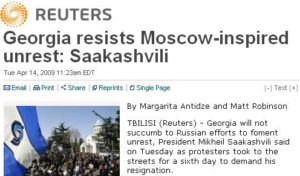
For Lenin, the only question that mattered in a revolution was ‘kto – kogo’: who is dominating whom?
Today, the questions of which people? and whose power? are seldom directly addressed in the media’s euphoric mentions of ‘people power’ during eruptions of popular protest.
However, they often determine the press angle and coverage of the events, especially during the recent near simultaneous anti-government demonstrations in Moldova and Georgia.
Throughout, all the Coloured revolutions adhered to a narrative that pitched the “modern and western” against the “backward-looking and Russian”. The recent events in Moldova were no exception.
As today’s NY Times article states: “In a way, Moldova is grappling with the same challenge as Georgia and Ukraine — trying to join the West after decades of Russian influence”
The young anti-government protestors, “in their teens and 20s, say they are desperate to escape a Soviet time warp and enter Europe. But many of their elders feel more affinity with Russia, and see the protests as a plot by their western neighbor Romania to snatch away Moldova’s sovereignty”.
Of course, these cleavages are misleading. For a start, the Communist Victor Voronin, whose electoral victory launched the revolt, has actually been vocally and consistently in favour of joining the EU and modernising the economy.
But those kinds of facts don’t matter. This is because, as we’ve seen so often in the past (remember Yeltsin on his tank?) when it comes to Western media interactions with people power, image is everything.
Just protesting the government is not nearly enough: here are the boxes that must be ticked for an uprising to get positive coverage in the US press:
Young?
Western educated?
Photogenic?
Media savvy?
Branded? (eg. Orange)
Modern?/Using new technologies? (eg. Twitter, Facebook)
In fact, the puerile coverage of these types of revolution does not even hinge on the specious and oversimplified left/right, young/old and pro-Western/pro-Russian distinctions. More disturbingly, it is all about perception, about being cool or uncool.
For instance, in Georgia, more than 50,000 protesters were on the streets on Thursday, many more than the crowds in Moldova.
However, the media coverage, as well as the Georgian social media, have been much more supportive of the Georgian status quo. For instance, Saakashvili – young, western educated, branded, photogenic, media savvy – gets his statements routinely turned into headlines in the west.

When was the last time something Vladimir Voronin – middle aged, Soviet educated, apparatchik-looking – said that appeared this way? Or Victor Yanukovich, for that matter?
The discrepancy is reflected in the internet response to the protests in Georgia, which has been much less enthusiastic than the Moldovan.
The young, westernised affluent bloggers in Georgia, who have much in common with the president, are generally lukewarm regarding the opposition, posting comments like the following:
Are opposition leaders more tolerant to different opinions that the government? Is Georgian society, maybe, not in general receptive to diversity of opinions or was this incident the result of a mob effect? Is Georgian opposition willing to listen to youth? These are some of the questions to be addressed and thought about.
Often, they have been downright sceptical:
Methinks, many people have one question in their mind these days – who wants Misha’s resignation? Are these protests in Tbilisi a genuine grassroots democratic movement, or is it just a Russian-orchestrated operation to oust Mikheil Saakashvili and to replace him with a marionette?
Whereas Moldovan bloggers and Twitterers have been portraying the protests as representative of public opinion, Georgian bloggers and Western observers have been much more cynical of the opposition:
It’s generally agreed that the main reason the rallies did not manage to chase Misha from power was that the opposition are trapped in a radical stance that is no longer widely popular in Georgia. People say they lack vision and that if they did oust Saakashvili their temporary unity would crumble and they’d be at each others throats, all vying for power, within days. Now, no one understands the limitations of the opposition better than the government.
Similarly, while much has been written about the Twitter-centric character of the Moldovan unrest…
it appears that text messaging and social networks like Facebook and Twitter played a key role in driving young people into the streets
….the Twitter tone is quite different regarding Georgia:
mhikaric: My friend couldn’t make it to work and is walking home. Once sympathetic to Opp, now pissed off & wishes they’d leave. Prob typical #tbilisi
Of course, in Moldova, only 16.2% of the population has access to the internet; with only 47,200 broadband connections in the entire country (for comparison, it is 70% in England and about 30% in Romania).
And as for twitter, Daniel Bennett has estimated that the number of people using twitter does not exceed 200 in the entire country.
Hardly a mass movement then. In fact, elitism was a central part of all the coloured revolutions. But who cares? For papers like the NYT, if a few cool people are doing something that correlates with a journalist’s conventional biases, it’s a trend!
As Hamilton Nolan wisely observed in Gawker,
Try this fun game: think of the most ridiculous premise you can. Then track down three people—no matter how disparate—whose stories can be presented in a way that roughly hews to said premise. Write your trend up as a story, put in the Times, and watch it become conventional wisdom quicker than you can say, I don’t know, ‘Absolutely Nobody Eats Cheese Any More, Because of Money!
No-one wants to read about the losers who don’t twitter, or speak English, or live in the capital city; who didn’t benefit from the post-communist ‘European dream’; who feel disorientated by the blinding lights of the new order and, instead of longing to escape to even more vivid pastures, seek a retreat into the comforting ‘old ways’.
Similarly, no one wants to read about the sour-pusses who want to spoil the party for the media savvy young reformers such as Saakashvili and Yuschenko, no matter what the (extraordinarily persuasive) arguments against them. Just as no one wanted to read about the saddo miners and ‘unreformed’ industrial workers who spoke Russian and voted for Yanukovich.
Or maybe people do want to, and it’s just that so few Western journalists, with their high school crushes and casual class and cultural biases, are willing to write about it?